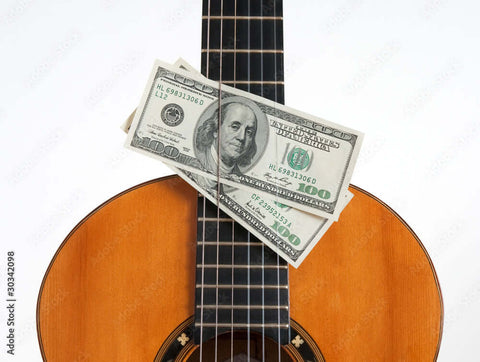Many people dream of learning how to play the guitar. It is an amazing thing to do whether your biggest ambition is to be able to hum along with your favorite tune, perform on a stage or just enjoy music as therapy; starting out on guitar playing is a fascinating project. However, like any other skill that has merit, it requires devotion, time and resources.

The price of lessons is one of the first things most would-be guitarists take into account when they think about starting. This comprehensive guide will help you understand why guitar lessons may cost differently and provide alternatives for learning while giving you some knowledge that can enable you make wise choices along your musical journey.
Understanding the Determinants of Cost

For various reasons, the expenses related to guitar lessons can differ greatly. The most influential factors are explained below:
1. Instructor Expertise and Qualifications: on account of being highly experienced and qualified teachers often charge more because of their expertise at a particular field. Their learning, performing experience or teaching certificates could influence how much they charge.
2. Lesson Format: Guitar lessons have different formats which include one-on-one sessions, group classes, online lessons or any combination thereof. Such decisions affect the costs as one on one lessons attracts higher charges compared to group ones.
3. Duration and Frequency: The cost of guitar lessons may vary depending on duration and frequency of classes. Hour-long sessions will be more expensive than half-hour session while week long sessions might attract different rates from bi-weekly or even monthly schedules.
4. Location: Prices of guitar training are affected by factors such as where you live (the cost of living) and how many other people in your region need guitar training services (demand). In this regard, urban cities may have rates higher than those in rural areas because there is a bigger population of musicians concentrated in these areas.
5. Additional Expenses: Apart from paying for classes there are still other things that you need to spend money on like tutorials in paper form (books) sheet music among others plus equipment such as a guitar and an amplifier and any examination or certification fees if you choose to pursue formal qualifications.
Various approaches for learning

When it comes to becoming a guitarist, you will find many alternatives. Traditional guitar lessons or studying by self are some of the options one has in terms of cost and convenience. Cost, ease of use and efficiency are some of the factors that differ various ways which are popular for teaching people on how to play guitar. Let us consider several popular ways for learning:
1. Private Tutoring: Learning how to play the guitar is a classic approach to getting private lessons from a personal coach. Despite the fact that they are more expensive than others, these lessons are unique as they pay attention to the individual’s needs and wants; use specially designed syllabuses and allow instant response from an expert.
2. Group Sessions: Group sessions of music learning could be chosen by those who do not want to learn alone (a social learning experience). This makes group classes affordable since costs are shared among its members, as well as enjoying a fun moment with other musicians while learning together.
3. E-Training: The popularity of online guitar lesson has risen because of technology advancement. YouTube, Udemy and other dedicated platforms for teaching guitar have tutorials and courses videos at different prices which might also be free.
4. Mobile phone applications and computer programs are widely available for easy learning of playing guitars in various types and forms. At times, these apps come with interactive tutorials which show you what to do step by step and keep track on your progress as you move along at your own pace. Some of them provide both free versions whereas premium subscriptions open up additional features or content.
5. Books can also help in teaching one how to play guitars traditionally apart from online resources and sheet music that supplement other means of study too. These may not give all the same level of interaction as lessons or video tutorials, they can be valuable reference materials and are often more cost-effective.
Making Informed Decisions

Before deciding on guitar lessons, consider the factors discussed above. Think about which option best suits your goals, financial situation, and learning style. Here are some tips for making an informed choice:
- Establish Clear Goals: Determine your reasons for learning guitar (personal pleasure, band membership, or professional aspirations). These goals will shape your learning journey.
- Explore Learning Options: Investigate different ways to learn guitar: private lessons, music schools, online courses, or self-teaching. Consider cost, reviews, flexibility, and the quality of instruction before making a choice.
- Consider Your Budget: Determine how much you are willing and able to invest in guitar lessons and related expenses. Keep in mind that while private lessons may offer personalized attention, group classes, online lessons, or self-study methods can be more budget-friendly alternatives.
- Seek Recommendations: Ask for recommendations from friends, family, or fellow musicians who have experience with guitar lessons. Personal referrals can provide valuable insights and help you find reputable instructors or resources.
- Take Advantage of Trial Periods or Free Resources: Many instructors and online platforms offer trial periods, free introductory lessons, or sample lessons. Take advantage of these opportunities to assess the teaching style, curriculum, and suitability before committing to a paid arrangement.
- Invest in Quality: While cost is an important consideration, prioritize quality instruction and resources that align with your learning goals. Remember that investing in your musical education is an investment in yourself and your passion for music.
The real cost of Guitar lessons:

Private guitar lessons are typically more expensive because they offer one-on-one attention and specialized teaching. Experienced instructors who personalize lessons to fit each student's needs provide valuable guidance and expertise, making these lessons worth the higher cost.
Private guitar lessons typically cost between $40 and $100 per hour, depending on the teacher's experience, where you live, and how long the lesson is. On the other hand, online guitar lessons are more affordable. Subscription-based platforms and individual courses usually cost between $10 and $50 per month. Online guitar lessons offer convenience and affordability.
They're more flexible than private lessons and provide access to a wide range of resources. However, they may not have the same level of feedback and personalized interaction as private lessons.
Famous guitarists who received Formal Guitar lessons:
Many famous guitarists have improved their skills through traditional guitar lessons, showing how important formal training is for learning music. For instance:

Both Eric Clapton and Jimmy Page are renowned guitarists. Clapton received early formal training from British musician Freddie King. Page began with classical guitar lessons but later shifted to blues and rock under the guidance of guitarist Big Jim Sullivan.

Eddie Van Halen mastered innovative guitar techniques and played with exceptional skill. Initiated formal piano lessons as a child. Developed his classical guitar abilities with the guidance of Stasys Šimkus.

Jimi Hendrix revolutionized electric guitar playing. Gained formal training from multiple teachers early on, including Warren "Buddy" Catlett in Seattle.

B.B. King's renowned guitar skills were heavily influenced by Bukka White, a blues guitarist who taught King in his early years. King attributes the lessons with White as crucial in developing his unique playing style and expressing emotions through his instrument.
The example of these guitarists highlights the importance of guidance and training in shaping even the greatest musicians. Their journey to excellence was supported by the knowledge and mentorship of others.
Conclusion
Embarking on the guitar journey is a fulfilling experience that unlocks doors to artistic expression and self-improvement. Although guitar lessons come with a cost, it's crucial to see them as a wise investment in your musical abilities and personal well-being.
To start playing the guitar with confidence, it's important to Know what affects how much a guitar costs. Look into various ways to learn the guitar. Choose the best guitar and learning method for your abilities and budget. No matter if you opt for private lessons, group sessions, online tutorials, or a mix of them, the thrill of creating music and becoming proficient with the guitar will ultimately surpass any financial expenses. Embrace the guitar, tune it, and embark on your musical adventure!






